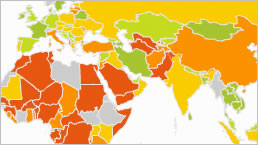06/04/2014 - 5:57pm
At its meeting in Hobart, Australia, on May 5-6, 2014, the GPFI reviewed its work to date and focused on how new technologies such as mobile banking and other innovations could help advance progress on financial inclusion in many developing countries. Delegates considered how the GPFI could help lower the cost of money transfers, which can attract fees of more than 30 percent in low-income countries, and improve the availability of remittance services, including from non-bank remittance providers.
In 2013, the G20 extended the GPFI's mandate to look at how to reduce the costs of remittances, making it easier and cheaper for migrants to send money home to their families in developing countries.
Speaking at the Hobart meeting, Australia's GPFI Co-Chair Rebecca Bryant said remittances were an increasingly important financing flow for developing countries, in some countries accounting for over 50 percent of their gross domestic product and totaling more than three times the annual value of all aid (official development assistance). "Remittances are an increasingly large source of financing for millions of recipient families and businesses in developing countries, with the total sent in 2013 equal to more than $400 billion," Ms. Bryant said.
During Australia’s G20 Presidency, the GPFI will update the Financial Inclusion Action Plan to focus on innovation and emerging technologies, remittances and other payment systems, women’s economic empowerment and strengthening engagement with the private sector.
In Hobart, the GPFI added a new Subgroup on Markets and Payment Systems to lead its work on remittances and drive the agenda on emerging technologies and financial inclusion. The Subgroup Co-Chairs are Australia, France, Mexico and South Africa.
The Subgroup will initially focus on actions related to remittances, specifically to meet existing G20 commitments to reduce the cost of sending remittances. The Subgroup will also tackle other aspects of remittances, such as the fact that many financial institutions have recently closed the accounts of Money Transfer Operators, with a resulting risk to the volume and costs of sending remittances. In the longer term, work will be done to expand opportunities for innovative technologies to grow financial inclusion, with a particular focus on how to increase the access to, and take up of, mobile money through new business models.
To help drive this work, the GPFI also welcomed the International Fund for Agricultural Development (IFAD) and the Better than Cash Alliance (BTCA) as Implementing Partners of the GPFI. BTCA is regarded as a leader in raising awareness of the benefits of replacing physical cash with electronic payments. BTCA’s work with the Subgroup will be on research, product development and advocacy for governments and others to transition to digital payments. IFAD is a specialist in the provision of finance to rural areas. The Subgroup will benefit from IFAD’s expertise in the development of innovative, cost-effective and easily accessible financial services.


